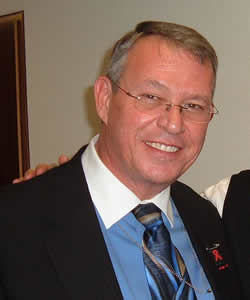The Rev. Karpf Tells BUSPH Forum: Make Patients Partners in Care.
Thirty years ago, when the disease ravaging the gay community had no name, a 34-year-old man named Jerome walked into The Reverend Canon Ted Karpf’s office in Dallas and asked a simple question:
“May I die in your church?”

The Rev. Ted KarpfThe Reverend Karpf welcomed the chance to minister to Jerome, as he has thousands of others with HIV/AIDS in the decades that followed. But as he has watched healthcare reform efforts devolve into a debate about insurance, reimbursement rates and systems of care, Rev. Karpf has worked below the radar to promote a new patient-provider relationship built on a basic notion: Shared responsibility.
The re-balancing of the care-giving relationship that he advocates — which he dubs “Decent Care” — is one in which a patient such as Jerome would be emboldened to ask, “May I live in your care?” rather than seek permission to die.
“Decent care places the care recipient at the center and asks, ‘What do you need?'” Rev. Karpf explained at a Feb. 8 public health forum organized by the BUSPH Department of International Health. “It’s so basic, and yet it never gets asked… Caregivers and care recipients need each other. We have a responsibility for each other. People need to know that someone is in it with them.”
Now the director of development and alumni relations at the BU School of Theology, Rev. Karpf sees the doctrine of Decent Care as bridging religion, medicine and public health. In essence, it calls on practitioners to be partners in healing, not just healers.
“Caring is a moral act,” he said. “Ask the question: ‘For whom are you advocating where you work? The system? The hospital? Yourself? The community?’ How you answer that question will shape the values you bring to your practice.”
The values that he now promotes came from years of working with AIDS populations in the U.S. and Southern Africa, and posts in the World Health Organization and the White House AIDS office, among other organizations. With support from the Ford Foundation, he and colleagues have refined the concept of Decent Care so that it encompasses six key values: Agency and dignity, on an individual level; interdependence and solidarity, on a social level; and subsidiarity and sustainability, on a systemic level.
Individual agency, he explained, means that every person has the capacity to direct his or her own care. ‘Subsidiarity’ instructs that resources should be allocated responsibly, by people closest to where the care is being offered.
The Decent Care model “challenges everyone to be more inclusive in health care-giving,” Rev. Karpf said. It requires changes to how practitioners speak to patients, and about patients.
“Very often the language is (distorted),” he said. Physicians might say, for example, “The patient failed on these drugs.” What they should say, Rev. Karpf advocated, is: “These drugs failed the patient.”
Jonathon Simon, chair of the Department of International Health and director of the Center for Global Health and Development, praised the Rev. Karpf as someone who had “helped the public health community really redefine the word ‘dignity’. He said the model of Decent Care extends well beyond HIV/AIDS, to all areas of healthcare.
Rev. Karpf, a 1974 graduate of BU, said that in some ways, the model he advocates hearkens back to a time when physicians and patients connected on a more personal level. He recalled working as a chaplain some 40 years at the old Boston City Hospital, ministering to the sick on busy weekend shifts.
“It was hell on a Saturday night,” he recalled, “but the quality of interaction was remarkable.”
Submitted by: Lisa Chedekel
chedekel@bu.edu